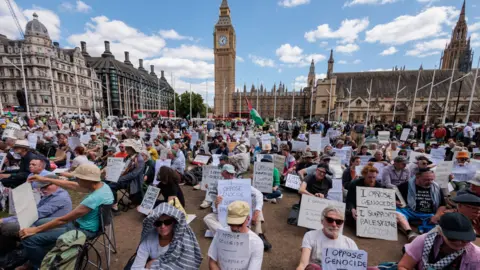In recent events, the protests supporting the group Palestine Action in London have escalated dramatically, resulting in the arrests of over 500 individuals. The Metropolitan Police confirmed that during the protest held on Saturday, a staggering 532 arrests were made, which marks one of the largest waves of detentions since the group was classified as a banned organization. The protests took place in Parliament Square, a significant location that often serves as a stage for public demonstrations in the United Kingdom’s capital.
Most of the arrests—specifically 521—were tied to participants displaying placards advocating for Palestine Action. This heightened police activity coincided with the government’s decision to impose a ban on the group back in July. Under the stipulations of the Terrorism Act, being affiliated with or supporting Palestine Action has now become a criminal offense, carrying severe consequences including prison sentences of up to 14 years. In addition to those charged with supporting the organization, several individuals were arrested for more serious offenses, including assaulting police officers, breaching public order conditions, and other public order offenses.
As the dust settles following this major incident, the Metropolitan Police revealed additional insights about those detained. They indicated that the average age of the arrested protestors was notably around 54 years, suggesting that the movement features significant participation from older demographics. In light of the arrests, the police’s Counter Terrorism Command is now focusing on compiling evidence and building cases against individuals accused of supporting this now-proscribed group.
The Metropolitan Police stated, “Over the coming days and weeks, officers from the Met’s Counter Terrorism Command will work to put together the case files required to secure charges against those arrested as part of this operation.” This declaration indicates the police’s commitment to rigorously pursuing potential charges in the wake of such a significant public disturbance.
The backdrop to these protests and arrests is the continuing tension surrounding the issue of Palestine, a conflict that draws passionate responses from many around the world. The Palestinian cause has garnered various forms of support over the years, prompting organized demonstrations, campaigns, and activism aimed at raising awareness regarding alleged injustices faced by Palestinians.
The protest on Saturday included numerous signs proclaiming opposing viewpoints on the topic of genocide and advocacy for Palestine Action. Many demonstrators occupied Parliament Square, with prominent London landmarks in view, including the famed clock tower known as Big Ben and the historic Palace of Westminster, further emphasizing the protest’s visibility and significance.
With the ongoing implications of the arrests, the legal and societal positions regarding the Palestine action dialogue and activism are likely to remain contentious topics within the UK and internationally. As the situation evolves, observant citizens, politicians, and human rights organizations continue to monitor how governmental policies and law enforcement agencies navigate legislation pertaining to protest rights and the designation of groups as terrorist organizations.
While the immediate aftermath of the protests exhibits a clampdown on free speech and assembly for supporters of Palestine Action, it also raises pertinent discussions about human rights, civil liberties, and the limits of governmental authority in democracies. The pending outcomes of ongoing investigations and potential trials will likely influence public opinion and the future landscape of activism related to Palestinian issues within the UK and beyond, reminding us of the volatile intersection between law, politics, and civil rights.











